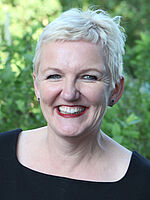Communication Design and Media – Diploma
The purpose of the Communication Design course is to enable students to design media, taking into account aesthetic, social and economic factors. Therefore, an equal amount of time is spent on artistic, scientific and technical issues in the course.
Communication Design is, first and foremost, the design of visual communication; however, it also extends to communication strategies as well as language communication.
During the foundation course, students are presented with an overview of artistic, social, scientific and technical principles in a structured system of courses. The main period of the course is predominantly project oriented; students are given the opportunity to specialise in various fields according to their requirements and leanings.
In addition to the subjects taught, communicative behaviour and the ability to work as part of a team are important skills which are promoted and applied in the project-oriented course.
The course of study promotes a sound and critical perception of the development of media and also addresses the political and ethical dimensions of modern mass communication. The wide range of issues dealt with in the course and the methods, findings and experiences conveyed offer multifaceted career opportunities for the graduates as designers or artists: e.g. working in advertising or design agencies, in publishing houses and for television companies, as well as opportunities for jobs in the fields of photography, film and web design.
Study Counseling
- Cultural Sciences
- Communication Sciences
- Communication Technology
- Artistic Principles
- Principles of Verbal Communication
- Principles of Design
- Technology
The main period of study comprises five semesters with one semester for the dissertation. The essential element concerns the project study. The main period of study is divided into the areas of practical design subjects, scientific-theoretical fields and the comprehensive field of artistic, scientific and practical subject groups.
- Cultural Sciences
- Communication Sciences
- Print Media
- Advertising/CI
- Film/TV/Video/Audio
- Photography
- Multimedia
- Illustration/Animation
- Free Art
- Typography/Font Design
- Cultural Sciences
- Communication Sciences
- Technical Sciences
- Economics
- Free Art/Experimental Design
- Typography
- Font Design
- Multimedia Design
- Text Design/Creative Writing
- Marketing/Management
- Illustration/Computer Design
- Photography
- Film/Video
- Foreign Languages
Course Content
The foundation course runs for three semesters and is clearly structured. The aim of the foundation course is to convey to the students the artistic, theoretical, design and technical basic requirements to enable them to work independently on projects in the main part of the course.
Job Description
As a general rule, the period of work experience takes place in semester five although it can also be freely arranged within the main period of study. It can be completed in Germany or in a foreign country, and suitable places for this internship are with publishing houses, graphic design and advertising agencies, radio and TV companies, cultural institutions, press offices and larger printing companies. The period of work experience may also be completed at the University.
After graduating as a Diplom-Designer (FH), communication designers can expect to find employment in all areas of media production, such as, for example in:
- Book and magazine publishing houses,
- Graphic design and advertising agencies,
- TV broadcasting organisations and film companies,
- Multimedia companies and
- in the construction of trade fair and exhibition stands.
It is also possible to specialise in areas of work such as illustration, graphic design, exhibition concepts etc., some of the graduates work as freelancers or in smaller designer groups.
Facts
Academic Degree
Diplom - Designer (FH) (Dipl.-Des. (FH))
Faculty
Design
Campus / Distance learning
Studies on campus
Normal period
8 semesters
Start of studies
to the winter semester
Place of study
Wismar
Classroom Languages
german
- General or subject-specific higher education entrance qualification
or
- Proof of completion of another educational qualification recognised as equivalent in the state of Mecklenburg-Vorpommern
or
- Passing an entrance examination (for applicants without general or subject-specific higher education entrance qualification) after at least two years of vocational training and at least three years of professional experience in a field directly related to the desired course of study.
or
- Passing an examination to complete advanced training as a master craftsman/woman in accordance with the Berufsbildungsgesetz or the Handwerksordnung in their currently valid versions
and
- Proof of a pre-study internship of at least 8 weeks in companies and institutions in the media and communications services, technology and production sectors, of which 4 weeks must be completed before the start of the course.
and
- Successful participation in the examination to demonstrate appropriate artistic ability – this procedure involves submitting a portfolio of artistic and creative work, completing a homework assignment and taking an aptitude test.

